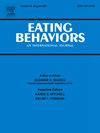Perfectionism and disordered eating in exercise and nutrition professionals: The role of self-compassion
IF 2.4
3区 医学
Q2 PSYCHIATRY
引用次数: 0
Abstract
Disordered eating (DE) is more prevalent among exercise and nutrition professionals (ENPs) which may be partially due to heightened levels of perfectionism. Self-actualizing strategies such as self-compassion may offer protection against DE but are not well-understood among health and wellness professionals. This cross-sectional study investigated the associations between multidimensional perfectionism (self-oriented, socially prescribed, and other-oriented perfectionism) and a two-factor model of DE: (i) weight and shape concerns and (ii) food preoccupation, among ENPs (N = 93; mean age = 33.5; 88.2 % women). Self-compassion was tested as a potential moderating factor. All three dimensions of perfectionism were positively associated with both DE factors. Self-compassion significantly moderated the relationship between self-oriented perfectionism and weight and shape concerns (b = −0.51, SE = 0.22, p = .023). Similarly, self-compassion moderated the relationship between socially prescribed perfectionism and food preoccupation (b = −0.39, SE = 0.19, p = .05). Findings suggest that self-compassion may help reduce the impact of perfectionism on DE risk in ENPs.
运动和营养专业人士的完美主义和饮食失调:自我同情的作用
饮食失调(DE)在运动和营养专业人士(enp)中更为普遍,部分原因可能是完美主义水平的提高。自我实现的策略,如自我同情,可能提供对DE的保护,但在健康和保健专业人员中并没有得到很好的理解。本横断面研究调查了多维完美主义(自我导向、社会规定和他人导向的完美主义)和DE的双因素模型之间的关系:在enp中(N = 93)体重和形状关注和(ii)食物关注;平均年龄= 33.5岁;88.2%为女性)。自我同情被测试为潜在的调节因素。完美主义的所有三个维度都与两个DE因素呈正相关。自我同情显著调节自我导向型完美主义与体重和体形的关系(b = - 0.51, SE = 0.22, p = 0.023)。同样,自我同情调节了社会规定的完美主义和食物专注之间的关系(b = - 0.39, SE = 0.19, p = 0.05)。研究结果表明,自我同情可能有助于减少完美主义对enp患者猝死风险的影响。
本文章由计算机程序翻译,如有差异,请以英文原文为准。
求助全文
约1分钟内获得全文
求助全文
来源期刊

Eating behaviors
Multiple-
CiteScore
4.20
自引率
3.60%
发文量
65
审稿时长
60 days
期刊介绍:
Eating Behaviors is an international peer-reviewed scientific journal publishing human research on the etiology, prevention, and treatment of obesity, binge eating, and eating disorders in adults and children. Studies related to the promotion of healthy eating patterns to treat or prevent medical conditions (e.g., hypertension, diabetes mellitus, cancer) are also acceptable. Two types of manuscripts are encouraged: (1) Descriptive studies establishing functional relationships between eating behaviors and social, cognitive, environmental, attitudinal, emotional or biochemical factors; (2) Clinical outcome research evaluating the efficacy of prevention or treatment protocols.
 求助内容:
求助内容: 应助结果提醒方式:
应助结果提醒方式:


